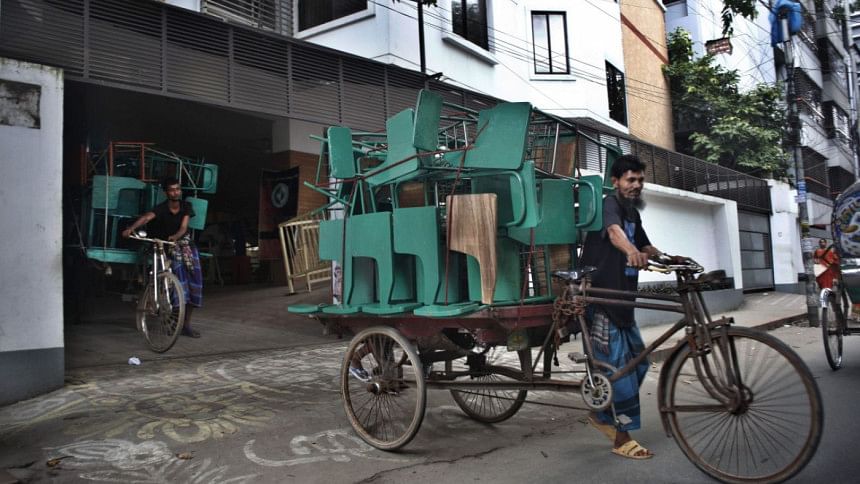“Move”, they said

It's called a sprawl. We just happened to experience a mushroom growth. It happened to us when schools, garment factories, stores, boutiques, offices just stealthily popped up in our neighbourhood. Instead of driving for an extra mile, we conveniently drove around our own vicinity when we wanted to have a cup of coffee, stopped by at a boutique to buy our clothes, and sent our kids to the nearest schools while we drove to our offices in the next block. Proximity breeds comfort. It also kills rules. So, every time someone orders for the mall next door to be demolished, they look for licenses, permits and violations.
Six months ago, the move to shift commercial establishments from residential areas started with full enthusiasm. Every newspaper, every talk show, every informal discussion centred around one decision. People walked in with concerns of relocation and finance. How would they shut shop overnight? Where would they go? While the noise was all over every area, every zone, one noise that never left my head was: Where was governance when all these shops, hotels, schools, factories were being built, right in front of our eyes? While we watched a housewife turn into a designer, a young graduate begin her own start-up, a young brother join a school, all of us had encouraged a whole community to contribute to the vibrancy of our neighbourhoods. While shops in garages sprung up, we watched people being employed, caterers boom, and regular people finding entertainment spaces right by their own abodes. Gradually, we have all become dependent on these outfits.
Running a bulldozer over an extended part of the house, which was being used as a bakery, is easy. But rehabilitating the baker, the waiters and the rest in there isn't quite so. But then again, who thinks about that anyway? And while shops are being demolished, evacuated, etc, while the owners are being punished, are we punishing those who allowed the sprawl to happen? Very often we forget that it's easy to exercise power, but difficult to introspect, self diagnose and treat our own evils that lie well within our own selves.
Dhaka has almost 50,000 people living in one square kilometre, compared to 1,510 inhabitants living in one square km in London, 10,831 even in the most populated city, New York, 11,297 in Delhi, and 6,897 in Hong Kong, one of the most populated cities in Asia. Therefore, in Dhaka how shall we ever be able to respect laws of zoning and have perfect plans of picture perfect neighbourhoods? A mix is inevitable! No matter where we go, even in the tiniest of neighbourhoods in Europe, every street has an art gallery, a café, a convenience store, et al. One misses nothing. Weekends are filled with flea markets, where people flock to get their grocery, find a little old urn or an old lamp and even discover rare books. Neighbours meet, kids chat, friends share a drink and in the process, it becomes a friendly space where one knows the neighbourhood barber, the restaurant owner, the IT whiz next door and so on and so forth. Those places have parks, where kids go play soccer while parents watch them with pride. In our case, even our schools don't have fields. Therefore, we don't know who our kids are bonding with over a sport.
All of that "para"/"moholla" concept is gone. As Baudrillard stressed on Hyper Reality, he aptly painted the post-modern man, who knows about his neighbour through a television screen. While we remain cooped up in our own comfort zones, we don't know who lives next door, or if they are in pain or danger. These are the curses of post-modernity. Isolated by selfishness, we live in times, where the minimal bonding happens over a neighbourhood coffee shop or a restaurant. And that too is at stake today.
I remember, as a young girl, I used to watch my parents agonise about their next move while landlords served them notices, day after day. I watched them circling the house-for-rent section in the daily newspapers, every time we had three months' notice to find our new temporary home. With time, I grew an expertise in packing and as a teenager knew different ways to label, separate and pack our stuff.
I will end this piece by sharing personal experiences of our workers who just relocated to a brand new factory 20 kilometres away from where they were. Some have settled into their new homes; some haven't. Those who couldn't, still commute in buses provided by the company. But the journey is killing for those who have motion sickness. That journey is equally unforgiving for those who have to return to their home late at night, as it takes at least one and a half hours to return from work. How could I explain this to authorities when we were first asked to relocate one of our factories from a shared building? How could I tell them that while I understood that it was not "safe" to be there because of shared tenancy, it had the best structural integrity out of all the factory buildings that we had? So, till date, the workers are still pining away to return to their old spaces, as the new place offers no comfort other than the satisfaction of working in a brand new space. Financial compensation has also failed to satisfy them.
Moving is not an easy thing. It is coated by uncertainty and fear of the next space not being as good as the last one. The cost of movement isn't comforting either as along with it comes the resistance to oppose the authority. If commercial spaces need to be shut down, authorities must kindly ensure that there are alternative spaces for them. Closure of business involves uprooting the lives of many. If commercial spaces need to be demolished, authorities must kindly guarantee a completely transparent process, which will not allow any under the table dealings. After all, the authorities have the right to decide, but it's also up to the people to resist any unilateral moves. And no authority is immune to public wrath.
The writer is Managing Director, Mohammadi Group.

 For all latest news, follow The Daily Star's Google News channel.
For all latest news, follow The Daily Star's Google News channel. 



Comments